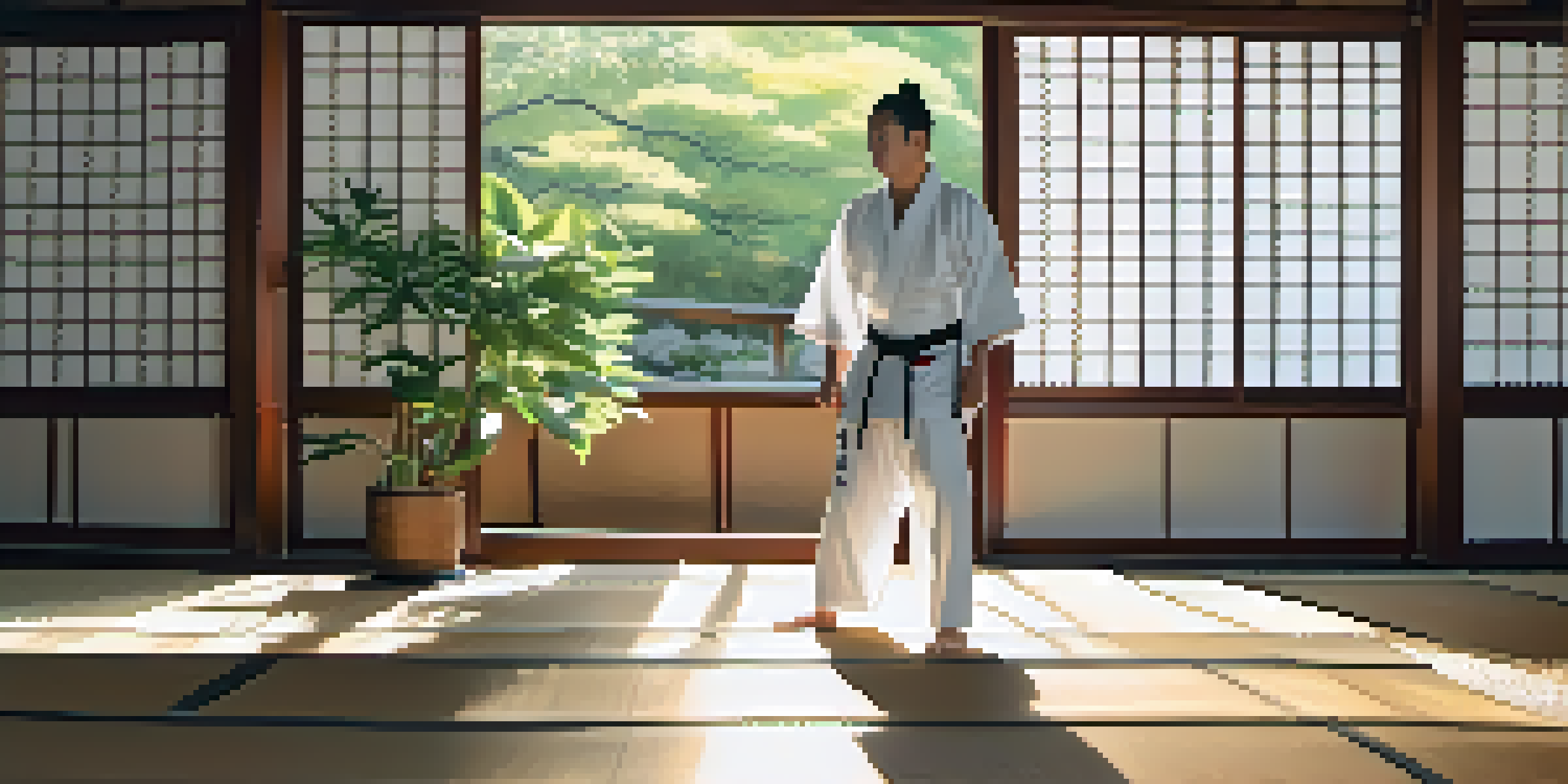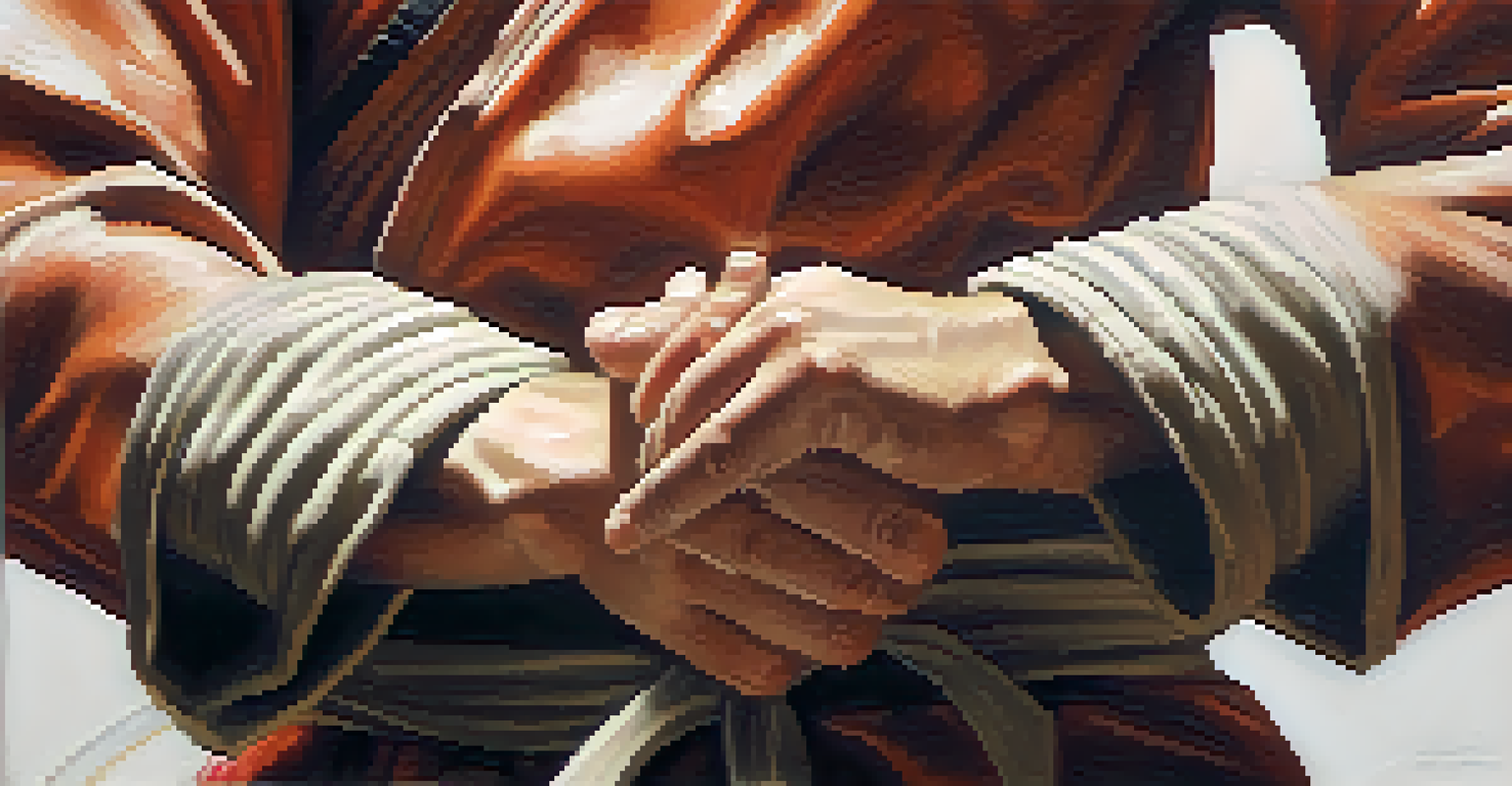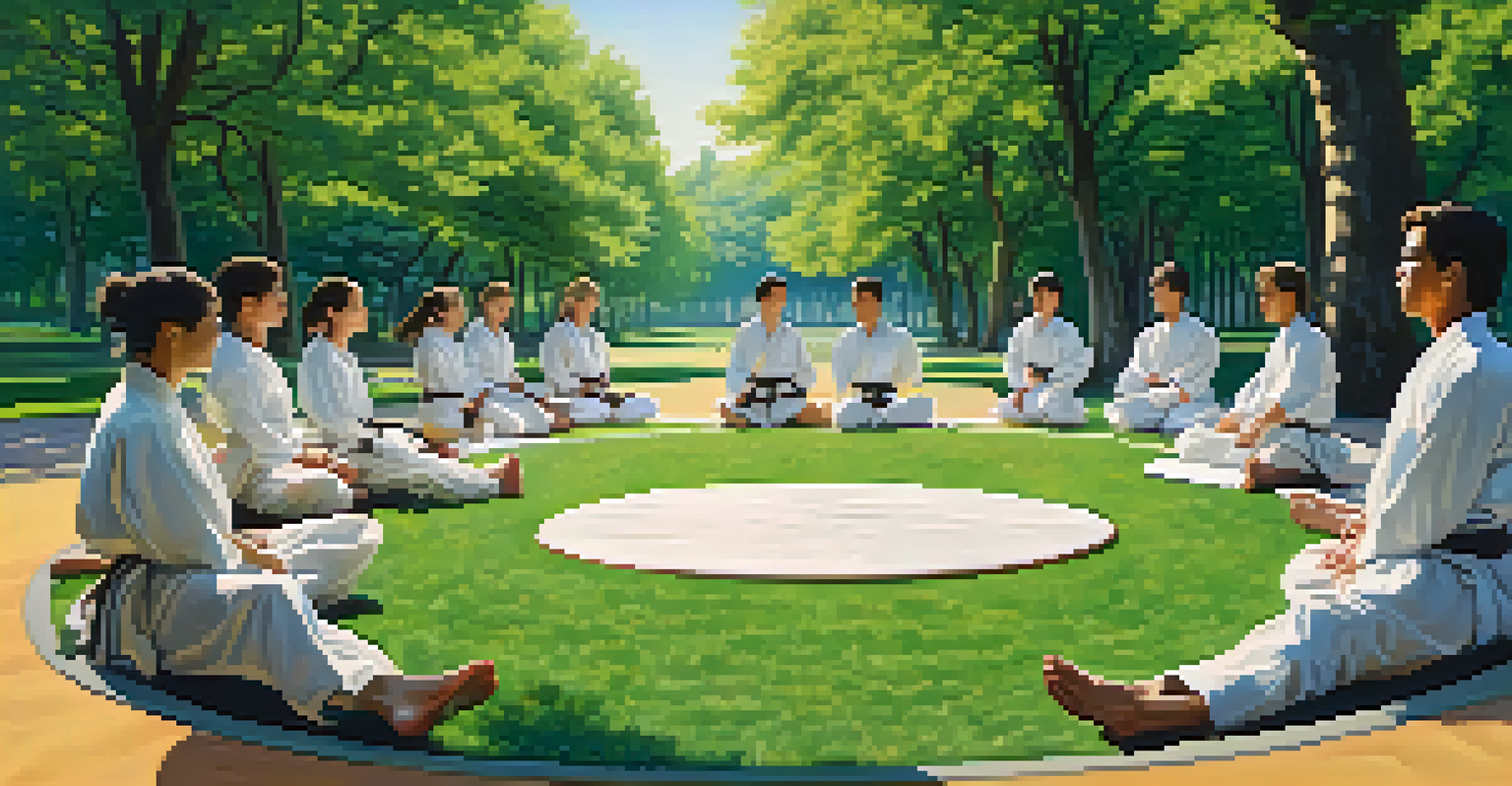The Role of Breath Control in Martial Arts and Mindfulness

Understanding Breath Control in Martial Arts
Breath control is a fundamental aspect of martial arts, influencing both performance and mindset. By mastering your breath, you can enhance your focus, stamina, and overall effectiveness in practice. Much like a musician tuning their instrument, martial artists use breath as a way to harmonize body and mind, creating a seamless flow during their movements.
Breathing is the first act of life and the last. Our very life depends on it. If we take care of our breath, our breath will take care of us.
In many martial arts, the rhythm of breathing aligns with the rhythm of strikes and movements. For instance, in disciplines like karate, practitioners often exhale sharply during a punch to maximize power and release tension. This synchronization not only boosts physical performance but also cultivates a deeper connection to the self, promoting a sense of inner tranquility amidst the intensity of practice.
Moreover, breath control serves as a practical tool for managing stress and anxiety, which are common in competitive settings. When faced with high-pressure situations, focusing on breath can help calm the mind and maintain composure. This technique is not just beneficial in martial arts; it’s a valuable life skill applicable in various scenarios, from public speaking to everyday stressors.
The Connection Between Breath and Mindfulness
Mindfulness emphasizes living in the moment, and breath control is a gateway to achieving that state. By concentrating on your breath, you anchor yourself in the present, reducing distractions and fostering a deeper awareness of your surroundings. This practice is akin to taking a moment to savor a delicious meal; it requires you to slow down and appreciate each bite, leading to a more fulfilling experience.

Incorporating breath work into your mindfulness routine can significantly enhance its effectiveness. Techniques such as deep diaphragmatic breathing not only relax the body but also sharpen mental clarity. Think of it as clearing the fog on a windshield; once the clutter is removed, you can see the road ahead more clearly.
Breath Control Boosts Performance
Mastering breath control enhances focus, stamina, and coordination in martial arts, making movements more effective.
Furthermore, breath control in mindfulness practices can facilitate emotional regulation. When you consciously slow your breath, you signal to your brain that it's time to relax, effectively reducing feelings of anxiety or anger. This simple act of breathing can transform a chaotic state of mind into one of calm and clarity, providing a powerful tool for emotional resilience.
How Breath Control Enhances Physical Performance
In martial arts, breath control directly impacts physical performance. Proper breathing techniques can improve endurance, allowing practitioners to train longer and harder without fatigue. Imagine running a race; if you focus on your breathing pattern, you can pace yourself better, leading to a more effective performance.
The breath is the bridge between the body and the mind.
Moreover, breath control helps in muscle activation and recovery. Controlled breathing increases oxygen flow to the muscles, enhancing their efficiency during intense workouts. Just as a car needs fuel to run smoothly, your body relies on oxygen to sustain prolonged physical activity.
Additionally, mastering breath control can lead to improved coordination and precision in movements. By syncing your breath with your actions, you can enhance your timing, making every strike or maneuver more effective. This synergy between breath and movement is what separates skilled martial artists from beginners.
The Psychological Benefits of Breath Control
Breath control offers significant psychological benefits, helping to cultivate a strong mindset in martial arts. It fosters concentration, enabling practitioners to focus on their techniques and strategies without being easily distracted. Think of it as tuning out background noise while studying; when you concentrate on your breath, you create a mental space free from interruptions.
Additionally, controlled breathing can enhance mental resilience. When faced with challenges or setbacks, returning to your breath can help maintain composure and clarity. This practice is similar to using a life jacket when navigating turbulent waters; it provides stability and support when you need it most.
Mindfulness Through Breath Work
Focusing on breath promotes mindfulness, reducing distractions and improving emotional regulation.
Furthermore, breath control can aid in visualization techniques, a critical part of mental training in martial arts. As you breathe deeply and steadily, you can visualize your movements and outcomes more clearly, boosting confidence. This mental rehearsal can be the difference between a successful performance and a missed opportunity.
Breath Control Techniques for Beginners
For those new to martial arts or mindfulness, starting with simple breath control techniques can be incredibly beneficial. One effective method is the '4-7-8 technique,' where you inhale for four seconds, hold for seven, and exhale for eight. This practice can help calm anxious thoughts and is a great introduction to deeper breathing.
Another technique is diaphragmatic breathing, which involves breathing deeply into the belly rather than shallowly into the chest. This type of breathing maximizes oxygen intake and promotes relaxation. Imagine filling a balloon; it expands fully when filled with air, just as your lungs do when you engage in diaphragmatic breathing.
Practicing these techniques regularly, even for a few minutes a day, can lead to noticeable improvements in both martial arts performance and mindfulness. Like any skill, consistency is key; the more you practice, the more natural controlled breathing will become in your routine.
Integrating Breath Control into Daily Life
Integrating breath control into your daily life can significantly impact your overall well-being. Start by setting aside a few moments each day for focused breathing, whether it's during a morning routine, a lunch break, or before bed. This practice can serve as a refreshing reset amid a busy day, much like taking a mini-vacation for your mind.
You can also use breath control techniques in high-stress situations, like before a big meeting or during a challenging workout. Taking a moment to breathe can help ground you and provide clarity in moments of pressure. Consider it a mental pause button; it gives you a chance to collect your thoughts and approach the situation more calmly.
Daily Integration for Well-Being
Incorporating breath control techniques into daily life can significantly improve overall well-being and resilience.
Lastly, sharing breath control techniques with friends or family can foster a supportive community. You can practice together, encouraging one another and creating a shared experience. This social aspect not only strengthens your practice but also builds deeper connections with those around you.
The Transformative Power of Breath Control
Ultimately, the transformative power of breath control in martial arts and mindfulness is profound. It’s more than just a technique; it’s a pathway to enhancing your physical abilities, mental clarity, and emotional resilience. Just as a river flows smoothly when unobstructed, mastering breath allows your energy to flow freely, leading to a more fulfilling practice.
As you become more attuned to your breath, you'll find that it extends beyond martial arts and mindfulness into all areas of life. Whether navigating personal challenges or pursuing professional goals, breath control can serve as your anchor. This connection empowers you to approach situations with a calm and focused mindset.

In conclusion, embracing breath control can lead to a richer, more balanced life. It's a simple yet powerful tool that can enhance your martial arts practice and promote mindfulness. So take a deep breath and start exploring the benefits today; your journey towards a more centered existence begins with a single breath.